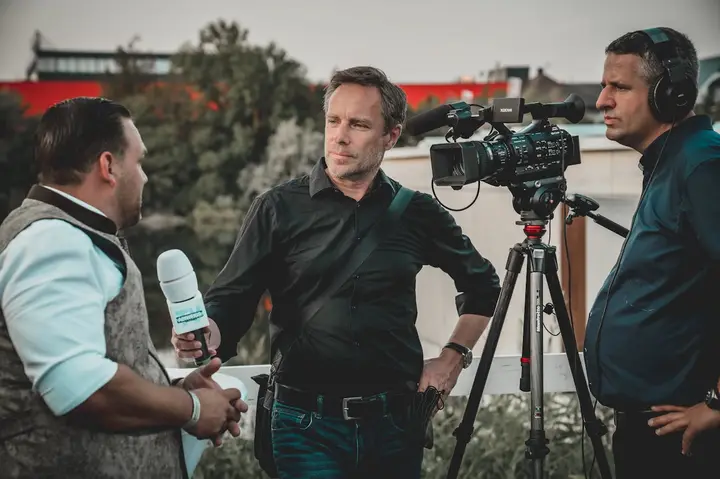The Shady Genesis of Operation Paperclip: A Technological Triumph Marred by Ethics
Posted by: sunxin in MOOC 3 months, 3 weeks ago
In the tumultuous aftermath of World War II, as the Third Reich crumbled and the world braced for a new era, an enigmatic figure emerged from the chaos. Wernher von Braun, a high-ranking Nazi engineer, coolly extended an olive branch to the US government, offering his expertise in exchange for sanctuary. This event marked the inception of Operation Paperclip, a clandestine operation shrouded in controversy and ethical dilemmas.
Designing a Just Society: The Veil of Ignorance Experiment
Posted by: sunxin in MOOC 3 months, 3 weeks ago
Imagine being part of a group of strangers, each with a unique mission: to design a society where fairness and justice prevail. But there's a twist. You are all operating under a "veil of ignorance," blind to the details of your own lives and those around you. This thought-provoking scenario is the foundation of a groundbreaking idea introduced by political philosopher John Rawls, aimed at crafting a utopia where no one has an unfair advantage.
The Paradoxical Power of Axioms: Unraveling the Banach-Tarski Conundrum
Posted by: sunxin in MOOC 3 months, 3 weeks ago
Imagine a mathematician, armed with an infinitely sharp knife and a perfect sphere. She proceeds to slice and distribute the sphere into an infinite array of boxes, only to reassemble these pieces into five distinct sections. With a deft touch, she rotates and rearranges these sections, defying all logic, to form not one, but two identical, flawless spheres. How is this possible?
The Rise and Fall of Chichen Itza: A Maya Metropolis's Epic Journey
Posted by: sunxin in MOOC 3 months, 3 weeks ago
Imagine standing atop the grand palace of Chichen Itza, gazing down at the bustling hub of a civilization that once thrived. In 889 CE, Lord K’ak’ Upakal might have done just that, unaware of the crises that lay ahead for this majestic Maya city. How did Chichen Itza rise to become the most powerful city of its time, and what led to its eventual decline?
The Hidden Power of Gas Masks: Protecting Us in a Polluted World
Posted by: sunxin in MOOC 3 months, 3 weeks ago
You may envision gas masks as bulky, eerie relics from the past, confined to the scenes of spy thrillers or the quiet halls of World War I museums. But the truth is, you likely already possess a mask leveraging the same incredible technology. And in the not-so-distant future, these filtering devices might become an integral part of our daily lives, safeguarding us against both emerging diseases and the increasing threat of wildfires.
The Transformative Power of Gratefulness: Unlocking Happiness
Posted by: sunxin in MOOC 3 months, 3 weeks ago
Have you ever pondered what truly brings happiness into your life? Is it a milestone, a triumph, or perhaps a cherished possession? In this thought-provoking animated adaptation of David Steindl-Rast's TED Talk, we delve into the profound connection between happiness and gratefulness, and how a simple shift in perspective can reshape our world.
The Mysterious Lifecycle of Mayflies: A Dance of Survival
Posted by: sunxin in MOOC 3 months, 3 weeks ago
Have you ever wondered why mayflies, those ethereal creatures of the insect world, gather in clouds above bodies of water, only to vanish within a day? What drives their brief, yet vital existence? Let's unravel the enigma of the mayfly's life cycle.
The Banality of Evil: Understanding Hannah Arendt's Disturbing Insight
Posted by: sunxin in MOOC 3 months, 3 weeks ago
What drives a seemingly ordinary person to commit unspeakable atrocities? This question took center stage on April 11th, 1961, as Adolf Eichmann faced trial in Jerusalem for crimes against humanity. Eichmann, a Nazi official who organized the transport of over 1.5 million Jews to concentration camps, appeared more like a bored bureaucrat than a sadistic killer. This disconnect sparked a profound revelation for philosopher Hannah Arendt, who termed the phenomenon "the banality of evil."
The Enigma of Lake Cadagno: A Time Capsule of Ancient Earth
Posted by: sunxin in MOOC 3 months, 3 weeks ago
Have you ever pondered the profound impact a single chemical can have on the entire planet? Roughly 3 billion years ago, a humble photosynthetic bacterium released a gas that would reshape the destiny of Earth's inhabitants. What was this gas? Oxygen. Yet, in the heart of the Swiss Alps, a hidden lake preserves a slice of pre-oxygen Earth, offering clues to our planet's ancient past.
The Illusion of the Benevolent Dictator: A Modern Reality Check
Posted by: sunxin in MOOC 3 months, 3 weeks ago
Have you ever pondered the myth of the "benevolent dictator"? The story of Cincinnatus, the ancient Roman statesman who swapped his plow for absolute power to save Rome, is a compelling one. But does such a figure fit into today's complex global landscape?
Recent Posts
- Tragedy Unfolds: The Heartbreaking Attack at Mogadishu's Leo Beach
- Clash in Liverpool: The Battle Between Anti-Racism and Anti-Immigration
- Tragedy Unfolds: Kerala's Heartbreaking Battle with Landslides
- Tragedy in Tarim: A Glimpse into the Aftermath of Israeli Aerial Strikes
- The Tragic Attack on Hamama School: A Story of Innocence Lost in Shik Radwan
Categories
- Official Announcement (3)
- News (1653)
- 新闻 (28)
- Technology (300)
- 科技 (235)
- 科普 (418)
- Science (409)
- 公开课 (180)
- MOOC (183)
- Business (36)
- 揭秘 (143)
- Mysteries (124)



